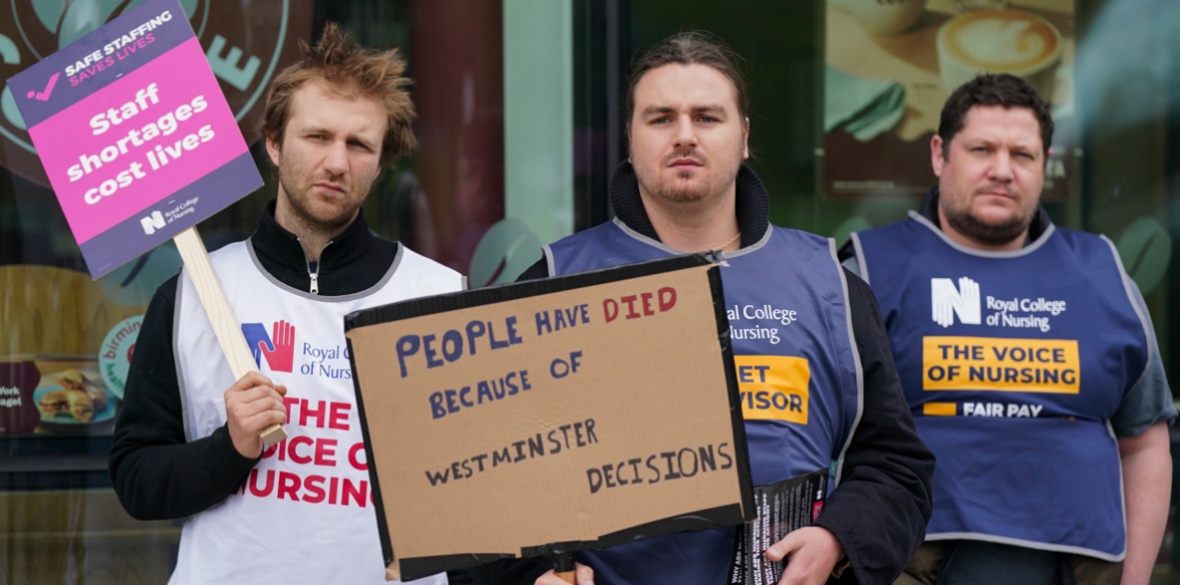THE government’s bid to secure consent, grudging or otherwise, for a 5 per cent pay rise across the board for last year’s NHS pay marks a staging point in the wages battle.
Everyone knows that this does not compensate workers for the loss in value of the wages over the past years.
Everyone knows that this will not blunt the desire for a more substantial rise in the new pay round.
Even ministers acknowledge that without the nurses willing to settle the issue is not resolved.
Everyone knows that without a substantial pay rise the recruitment and retention crisis will grow worse. An unsatisfactory conclusion to this delayed pay round will simply store up tensions for the next round.
Our May Day celebrations took place as thousands of workers — in the NHS and in education, in industry and the service economy — are dealing with a runaway cost of living.
It revived the sense that International Workers’ Day is the one point in the year when we both celebrate our collective strength and unity and reflect on how our unity can be strengthened.
But for bankers, every day is a celebration of their wealth and continuing power and we need to do something about it.
It is to the Financial Times and the estimable Professor Tim Bale that we owe the intelligence that many more British bankers — or rather bankers in the City of London — “earn” over a million pounds per annum than do bankers in the capitals of our European neighbours.
Blessed indeed is a capitalist country that has fewer bankers than Britain. It is precisely the domination of the City of London — the global capital of speculation — over the British economy that has marked the deconstruction of Britain as a manufacturing country.
The root of Britain’s sluggish economic performance lies in low investment and low productivity. Before the 2008 financial meltdown Britain’s GDP per capita was well below Germany’s at around 6 per cent.
Since then the gap has widened even further to around 11 per cent, even though Germany’s economic performance is weakened by the disproportionate impact of the sanctions against Russia on its manufacturing sector.
For workers in Britain the rate of exploitation has increased with an increase in the hours worked amid a prolonged pay freeze.
Labour productivity — a clear measure of investment in plant, technology and training — grew by under 0.5 per cent a year in the decade after the bank crisis, lagging well behind developed economies.
Weak productivity growth expresses itself in day-to-day life as a decline in the purchasing power of wages. Even as the post-war growth cycle worked itself out after 1968-70 wages in Britain we still growing.
By the time the new century was under way income growth dropped below zero.
French and German workers work in capitalist economies — but sustained by higher levels of investment, more training and both with governments with more active industrial policies than here.
This is not an argument for a different kind of capitalism but for an end to it. The shape of finance capitalism we experience in Britain goes with our subordinate role as the global partner of the US.
What is fascinating at present is how Britain’s ruling elite is now being drawn in different directions as European states face sharpening contradictions with the US, with European exports hit by the double whammy of Joe Biden’s protective subsidies to domestic US production and the exorbitant cost to Europe of alternative (substantially US fracked gas) supplies that have replaced Russian energy.
A parasitic finance sector and a profit-seeking war economy do not fit with higher wages and better services for the mass of the British people. Which is why Nato’s proxy war is a class question for British workers.










